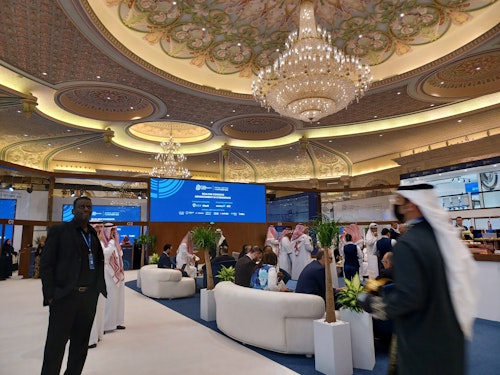Euronews brings the latest news from the Global Cybersecurity Forum in Saudi Arabia.

 ${title}
${title}
Live ended
End of the Global Cybersecurity Forum
That's it from us at Euronews and Africanews from the Global Cybersecurity Forum.
I hope you enjoyed our live coverage and learned a little bit more about everything cyber from some of the best and brightest in the world.
Thanks to the Euronews and Africanews team: Jane Witherspoon, Toby Gregory, Bridget Ugwe, Anna Desmarais, Salamat Hussain and Muku Pandey.
Closing ceremony
Standing room only for a closing ceremony at the Global Cybersecurity Forum.
It was a packed two days of conversations, meetings, and agreements signed on the floors of the Ritz Carlton.
GCF as a platform launched a Child Protective Index to track progress on making online gaming a safer environment for children.
Duke University took the time to launch a new report alongside the forum into barriers for women entering cyberspace. The report found that 64 percent of respondents believe that women are underrepresented in the sector.
The moderators say the report will be used to increase women's participation by giving them more role models and as a way to set individual country targets to get more women in the field.
On the same theme, GCF and UN Women signed a memorandum of understanding to "advance knowledge exchange and collaboration" to get more women in cybersecurity.
Many of the panels also dealt with the threat and opportunities that AI can pose for the sector and the need to use it to show the public that it can be trusted in cybersecurity operations.
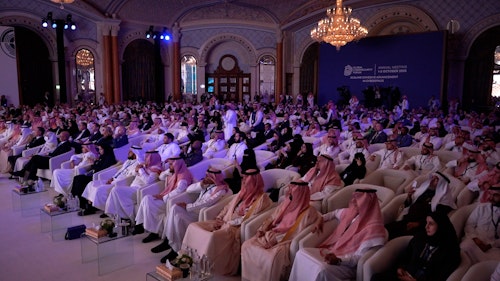
'Focus on AI in context' for more effective cyber protections
To better embrace the changes that artificial intelligence (AI) is going to bring, it needs to be tailored and specific.
That's one thing that Marcus Fowler, the CEO of cybersecurity platform Dark Trace and Ultan Mulligan, chief services officer, European Telecommunications Standards Institute (ETSI), agreed on in a panel on emerging technologies.
"Focus on AI in a particular context, how do you use it to solve a particular activity," Mulligan said. "You have to put it in a context."
For example, Fowler said that one of their AIs is able to concentrate on responding to low-level alerts, while the humans in the company focus on longer, more labour-intensive investigations.
"There are too many jobs to replace everyone [with AI], so its about accelerating the human response," he said.
The companies that do that will fare better than those that do not fully integrate AI, because it will make them more productive, Fowler said.
AI is particularly interesting for small and medium-sized businesses (SMEs) because it can help them "bring ideas to market," Mulligan said.
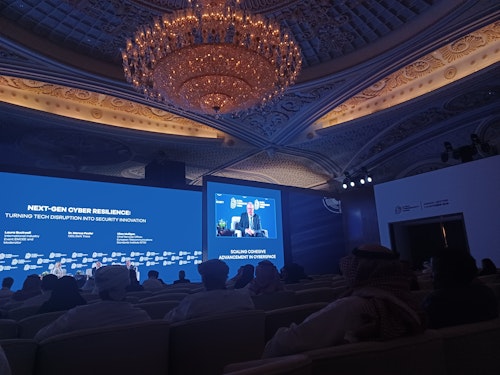
'Cybersecurity is a cross-border issue'
Our live team is coming back from two back-to-back panels on inclusion and how to take advantage of innovative technologies in cybersecurity.
In the first panel, Craig Jones, member of the GFCE Foundation Board, said there are roughly 20 to 30 countries that have a good level of cybersecurity protection but there's "a whole trench in the middle that can be nudged along."
It's essential that they are, because it will impact their national security, he added.
"We need to bring back into cyber is national security ... we have to change that language as well," he said.
For example, Mohammed Ben Amor, the secretary general of the Arab ICT Organization (AICTO) said there are some inequalities in cyber capacities between the Gulf States.
Saudi Arabia, the United Arab Emirates as well as Qatar have "advanced" capabilities, but others in the region need a bit more assistance to get to the same level, he said.
However, Ben Amor, said that Saudi Arabia has adapted strategies to get them there through the creation of the Arab Security Ministers Council, which met yesterday at a side event to the conference.
At the side event, the council adopted a draft of the Arab cybersecurity strategy, agreed to sign the United Nations Convention against Cybercrime and adding the council's membership in international organisations.
'We are already in a hybrid war with Russia'
A big statement just now to our Euronews and Africanews team from Jose Barroso, the former president of the European Commission.
"We are already in a hybrid war with Russia," Barroso told Euronews, noting that Russia has mounted disinformation campaigns and alleged attacks against internet cables in the Baltic Sea.
The informal meetings saw European leaders flag cybersecurity as one of the priorities
Barroso's statement is similar to ones made by others at those meetings, who agreed in public statements that threats to Europe come over several fronts, like conventional, cyber and hybrid warfare.
Barroso said he believes that European leaders laid out a great framework for broader defence and security investment at recent meetings in Copenhagen, but that it now comes down to lifting that roadmap off the page.
"As always, the problem with Europe is always execution, execution, execution," he told us.
Inequalities in cybersecurity
The main message from Bocar Ba, the CEO of Dubai-based telecommunications provider SAMINA is that we need to invest in smaller, less rich countries to fight cyber security.
A 2020 study published in Third World Quarterly found that developing countries lagged behind developed countries in cybersecurity metrics, like the Global Cybersecurity Index published every year.
A country's cybersecurity measures also directly impact the number of people online in any given country.
A 2021 comparative study of 78 nations published in Springer Nature found that factors like GDP, infrastructure and the scale of internet use are related to how much the country has built up its cybersecurity systems.
"We may have strong relations, but the weakest nation may have an impact on the security of the strongest nation," he said. "Investing in cybersecurity ... is also about investing in cyber diplomacy."
We'll be hearing more about this in a panel conversation "Strength in Reinforcements, Capacity Building in the Global South" later this afternoon.
'Ransomware attacks that destroy everything'
Igli Tafa, the director general of the national cybersecurity authority in Albania, said that his country is receiving many "ransomware attacks that destroy everything" directed at its critical infrastructure in the last three years.
The targets are mostly critical infrastructure, energy and transportation sectors.
To address this, the country's identified some gaps in infrastructure and are addressing those but he says they require solutions that can be coordinated by more than one country.
That follows a theme that we've heard from other countries here at the GCF, that smaller governments have a harder time responding to cybersecurity breaches than other countries with bigger budgets.
Women in cyberspace
We've just spoken to Sarah Hendrix, interim deputy executive director of UN Women.
There are more women in cybersecurity than ever, which Hendricks says is a good news story.
The sad part though is they still only make up 24 percent of the cyber workforce, she said.
This despite hearing from experts yesterday that there is a worker shortage in most cybersecurity fields. And, last year, GCF put a number to it: 2.8 million workers are needed across the globe for cybersecurity to work at its full capacity.
The GCF started an initiative at last year's event called "The Women Empowerment in Cyberspace” to bring cybersecurity to young girls from grades K-12, raise global awareness of cybersecurity professions, recruiting female talent, put in place strategies to retain female middle managers and create a path to leadership.
On the agenda today
This is what we're going to be watching for today:
- A panel discussion on harnessing emerging technologies like AI, quantum computing and robotics in the sector
- Another discussion about cyber resilience and security innovation
- Interviews with Albania's former national security director, Bocar Ba, the CEO of Dubai telecommunications operator SAMINA Council and José Manuel Barroso, the former president of the European Commission and others.
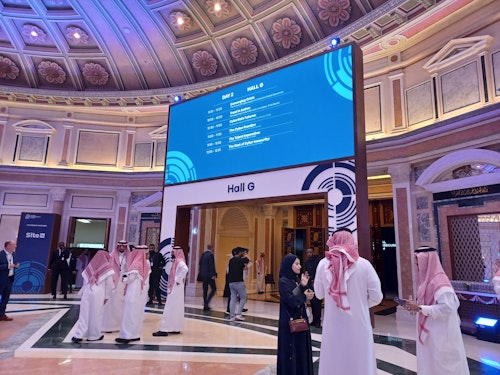
Where did we leave things yesterday?
So before we go full tilt into Day 2 and any more data, here's a quick little recap of where we left things yesterday.
Saudi officials announced a new initiative with the United Nations called the Global Initiative for Capacity Building on Cyberspace.
The initiative will "accelerate capacity at scale from training and education to policy and research development," said Majed bin Mohammed Al-Mazyed, the Governor of the National Cybersecurity Authority of Saudi Arabia.
We listened to great panels about diplomacy in cybersecurity where the main message was to "start small, succeed and then scale," from the former president of Croatia.
We heard from experts in defence who are concerned with how AI will develop in the industry, with some saying its a great opportunity to automate threat detection but others say its tough to regulate the software that's already out there and being used for attacks.
A fireside chat with the ITU said that AI in cybersecurity needs to be standardised as soon as possible to make sure people in the industry know how to keep things safe.
We also did spotlight interviews with Macky Sall, the former president of Senegal, Jürgen Stock, former secretary general of Interpol, cyberpsychology professor Mary Aitken, Craig Jones, the immediate past director of cybercrime at INTERPOL and Robert M. Lee, the founder and CEO of cybersecurity firm Dragos.
Ready for Day 2
Good morning from the second day from this beautiful hotel of the Ritz Carlton of the Global Cybersecurity Forum in Riyadh, Saudi Arabia.
We're starting the day off with some new data from Moody's 2025 cybersecurity survey that found weak artificial intelligence (AI) governance could mean more breaches to come.
The survey asked 2,000 companies what their AI policies are and most say that they are lacking clear policies governing use of AI in the workplace.
Without any restrictions, it means that employees may "inadvertently share sensitive or proprietary data with public AI platforms," the report found.
This is one of the themes that we heard yesterday, that AI can be both a blessing and a curse for the cybersecurity industry.
The pros: it will help with detecting threats before they happen.
The cons: it makes it cheaper and more affordable (as low as $34 dollars or €28.98 a month, according to Deloitte) to commit an attack.
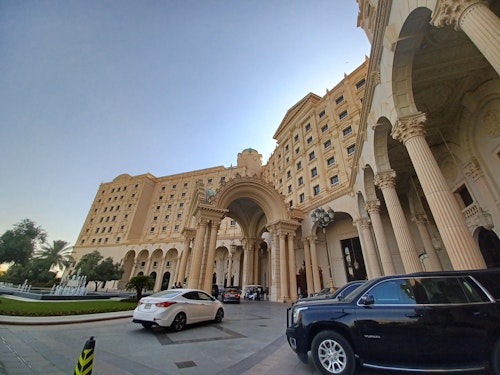
End of Day 1
People are wrapping the night up and heading to a Riyadh terrace, so that is the end of Day 1 here at the Global Cybersecurity Forum. Be back tomorrow with more updates.
1865 meets 2025
Doreen Bogdan-Martin, secretary-general of the International Telecommunications Union (ITU), took Riyadh back to 1865 in her fireside chat: "Securing Prosperity: AI Preparedness in a Connected World."
Fun fact: the ITU was built in 1865 to set standards to make sure telegraphs could be sent between countries. Now, they're working on how to regulate AI deepfakes and misinformation.
"Standards are that invisible backbone that ensure communications happen that technology is interoperable, that its interconnected, that it's trusted," Bogdan-Martin told the room.
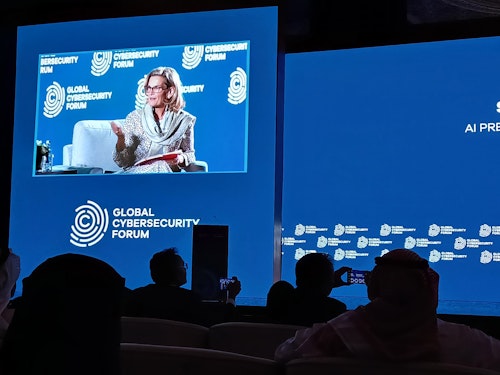
'It's scarier than you think'
Robert M. Lee, the founder and CEO of cybersecurity firm Dragos told Euronews that it's important for businesses and individuals to take steps as soon as possible to get their cybersecurity systems in place - because things can escalate quickly.
"It's not as scary as you imagine but it's worse than you realise," he said.
'You have to be protected from everybody'
Craig Jones, the immediate past director of cybercrime at INTERPOL, said its up to civilians to protect themselves against cyberthreats.
He compared it to the security that you have at a home or apartment, like securing the windows and doors with locks.
"Once you're on the internet, you have to be protected from everybody," he said.
'An attack against humans'
Next up, we heard from cyberpsychology professor Mary Aitken who wanted to remind those at the forum that a cyber attack is "not just an attack on a machine, it's an attack against humans and the human mind.
"We're going to have to up skill at scale to deal with this attack," Aitken said.
What the public needs to do to protect themselves from cyber threats
We're starting to upload our interviews with the who's who at the forum.
Jürgen Stock, former secretary general of Interpol, told Euronews that we are facing an "online epidemic" of cybercrime and to stay safe, people should be updating their devices and to install any software that might be available to secure their systems.
What keeps defense cybersecurity experts up at night?
The biggest threats to defense, according to the panelists, is AI.
Mohammed al Khalifa: "One person can look for more opportunities to attack," he told the panel. "It's already weaponised without regulations, [because] you cannot regulate these kinds of tools, so you need to be aware and prepare to recognise these attacks."
With this comes cheaper ways to mount attacks, said Romania's Dan Cimpean. A Deloitte report estimates that a low-budget cyber attack where hackers invest $34 (€28.98) a month could bring back $25,000 (€21,310.69).
What this means according to Cimpean is that businesses need to move away from traditional cybersecurity towards resilience, so how companies will be able to bounce back from attacks when they do happen.
How to keep the defense scale up safe in cyberspace
We're coming up to the next big session: building a thriving and innovative security and defense ecosystem with Romania's Dan Cimpean, the director of the country's national security directorate, Jean-Paul Palomeros, the former supreme allied commander transformation, NATO and Shaikh Salman bin Mohammed al Khalifa of Bahrain.
Defense investments from the European Union will reach around 130 billion this year and will be closer to 800 billion by 2030. So far, only 3.5 billion of this will be earmarked for cybersecurity spending, according to the EU's Security Action for Europe plan. So how do we keep Europe's - and the world's - security scale-up safe from attack?
Delegates at this year's Global Cybersecurity Forum will discuss "scaling cohesive advancement into cyberspace".
Attendees will aim to tackle issues such as using technologies like artificial intelligence (AI) and quantum computing to solve cybersecurity's most pressing questions.
They will also aim to build cohesive cybersecurity strategies in "a rapidly evolving and divided global landscape".
Follow along with the day's action on our live blog:
Macky Sall: "Africa has a role to play"
Here is Africanews' Bridget Ugwe with Senegal's former president Macky Sall.
Sall told us that Africa should move away from consuming technology to become an strategic actor not just in cybersecurity but all the science, technology, engineering and mathematics fields (STEM).
He insisted that African Nations should invest massively in training its youth, in partnership with big international institutions like the World Economic Forum, and the tech giants from Google and Amazon.
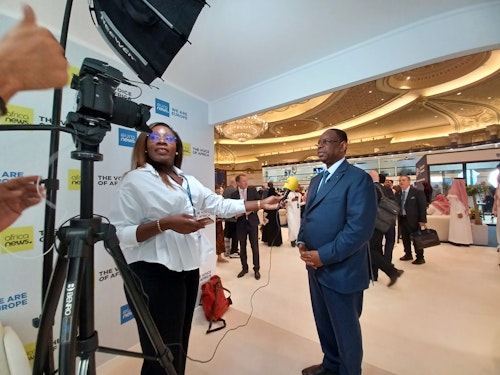
What we are doing between sessions
The Euronews and Africanews teams are busy networking with GCF delegates and are arranging interviews with the forum's key contributors.
This is who we will be talking to in the coming days:
- Jose Manuel Barroso, former president of the European Commission
- Macky Sall, former president of Senegal
- Bocar Ba, chief executive officer SAMENA Telecommunications Council
- Laurent Gisel, head of arms and conduct of hostilities unit, ICRC
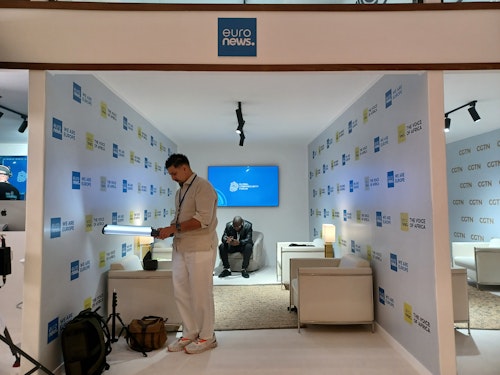
Guterres' address
We got access to the whole address from UN Secretary-General Antonio Gueterres.
Take a look:
How do you regulate AI in cybersecurity?
John Defterios, the former emerging markets editor for CNN, asks Kitarovic how to create cooperation in the age of AI.
"I do believe we will need regulation," Kitarovic said. "We have to look at what we are doing ... we have to have an approach that starts from the premise 'how do we make our treaties future-proof so they don't expire like yesterday's software ?'"
To her, that means establishing panels like the UN's group of experts on artificial intelligence to watch how the technology is evolving and adapt rules, through annexes, to keep it current.
Kitarovic points out that AI is an opportunity but also a risk to those in the profession.
On one hand, the forum organisers say that AI can help with detecting threats in real-time, automatically responding to treats as they come as well as making models that can predict potential breaches.
However, most like Kitarovic, believe that AI will give attackers an advantage.
Research has shown that its easy to change the code that dictates how AI models behave and what questions they are allowed to answer so hackers can take advantage.
We're already seeing models of OpenAI's popular chatbot ChatGPT be used by hackers to generate phishing emails or to clone voices. The most popular of these dark uses of AI, WormGPT, is almost as wold as the first OpenAI model.
Take a look at some of our related coverage to learn more about AI in cybersecurity.
AI is increasing cyberattacks and Europe is being hit the hardest
Europe is one of the regions hardest hit by cyberattacks in 2025, according to a report from an American cloud security company.
"Advancing the interests of citizens"
Chris Inglis from the United States reiterates what Kitarovic says, that cohesion should be about finding the most common needs of citizens, not just stopping cyber attacks.
"We are advancing the interests of our citizens, there's nothing more collaborative than that," he said.
"Start small, succeed and then scale"
Croatia's Grabar Kitarovic: "Building trust isn't easy, but its worth it."
Kitarovic says consensus in cybersecurity should be about agreeing to certain principles, not necessarily everything. She's suggesting that leaders need to start small with initiatives like joint security exercises and sharing information.
Leaders also need to find common ground on important cybersecurity issues, like protecting children from online threats.
She says that citizens also need to see success in cybersecurity, including the number of attacks that have been stopped so they can come to support any regulation that will come next.
The basic message: Start small, succeed and then scale.
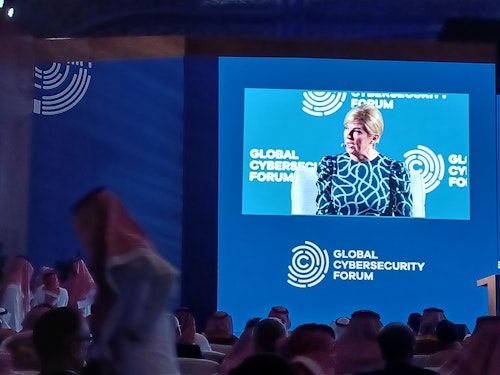
First panel discussion with Croatian, Senegalese, US leaders
Up first in the GCF's programming is a panel called Against the Odds: Gaining Consensus amid Complexity.
H.E. Kolinda Grabar Kitarovic, former president of Croatia, H.E. Macky Sall, former president of Senegal and Chris Inglis, the former national cyber director from the United States are set to take the stage.
This is one of the core themes of the conference: bringing leaders together to collaborate on how to fight back against cyber crime despite different national interests.
A new Saudi-United Nations Global Initiative
H.E Majed bin Mohammed Al-Mazyed, the Governor of the National Cybersecurity Authority of Saudi Arabia, is now taking to the stage to welcome delegates.
Al-Mazyed announces a Global Initiative for Capacity Building on Cyberspace on behalf of the Saudi government in partnership with the United Nations. The initiative will "accelerate capacity at scale from training and education to policy and research development," he said.
Al-Mazyed also talks about how the government of Saudi Arabia is working to develop "evidence-based research to unlock the full economic opportunity" that cybersecurity can bring.
Then a remote word from Antonio Guterres, the Secretary-General of the United Nations: "We must work together to make sure that cybersecurity works for the common good".
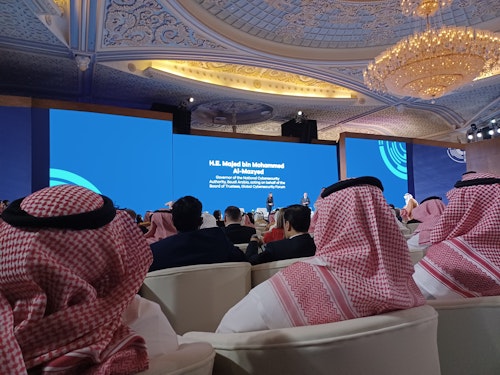
First moments
We're getting started here in Riyadh with the Saudi national anthem and a welcome from HRH Prince Faisal bin Bandar bin Abdulaziz Al-Saud, the governor of Riyadh Province.
What's at stake
There's lots of money involved if a cyber attack happens.
Global losses from cyber crime are supposed to reach $10.5 trillion (8.92 trillion) in 2025, in both direct costs like stealing funds and loss in revenue if companies lose their capacities even temporarily in a cyber attack.
One of the questions that will be addressed is: how can governments, technology companies and technology leaders collaborate to make sure less money and time is lost to cyber attacks?
What is cybersecurity?
So what is cybersecurity and why is Euronews covering it?
Cybersecurity is the combination of methods, processes, tools and behaviours that protect computer systems, networks and data from nefarious actors that are looking to steal it.
These cyber attacks are up 75 percent in the last five years, according to the organisers of the forum.
Just last week, airports in Brussels, Berlin and London reported disruptions to their electronic systems because of a cyberattack that made check in and boarding impossible.
From 2023 to 2024, critical infrastructure, so hospitals, power plants and transportation networks sustained over 420 million cyberattacks, or 13 attacks per second.
We see it more and more in everyday life too. Over 85 percent of survey participants by Finnish cybersecurity company F-Secure said they had received a digital scam attempt in 2024.
That can be anything from a suspicious phishing link that you get by text, a suspicious email from someone impersonating a colleague or family member or even an AI-powered phone call that uses a clip of a loved one's voice.
On the ground at the Global Cybersecurity Forum
Good morning from the Ritz Carlton in Riyadh, Saudi Arabia, where Euronews is on the ground to cover the Global Cybersecurity Forum (GCF).
This year's conference, called "Scaling Cohesive Advancement in Cyberspace" is looking to strengthen global cyber resilience by advancing international collaboration and purposeful dialogue between C-Suite executives, government officials and organisations.
We’ll be here for the next two days bringing our followers the latest in the world of cybersecurity. On the agenda for day one: fireside talks with Dr. Saad Alaboodi , Chief Executive Officer of Saudi Information Technology Company (SITE), Ahmad O. Al Khowaiter, Chief Technology Officer of Saudi Aramco and Doreen Bogdan-Martin, Secretary General of the International Telecommunications Union (ITU).
